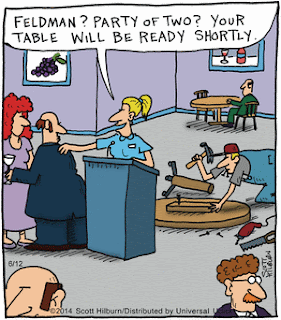You will recall, Dear Readers, that last week I started a discussion about reducing the size of the federal government. This is one area where I am in fundamental, although not total, agreement with most conservatives and libertarians, although we approach it from differing perspectives.
I believe, as do my conservative and libertarian friends, that government should be as small as practical, that its activities should be limited to those which are essential at each level (national, state, and local), and that it should be as unobtrusive as possible in the life of the average citizen. The problem, as I wrote before, is that we have an enormous government today because we’ve asked for it … not in so many words, but we have decided as a nation that there are services and protections we want and expect our government to provide, and our government has grown a gigantic bureaucracy to provide them.
And so today we have a national government that spans three branches (Legislative, Executive, and Judicial), fifteen cabinet departments, some 57 “Independent Establishments and Government Corporations,” and any number of other dogs and cats* that exist both on and off the books. Beneath that, each state has its own government with all its own departments and agencies, and below that, each county (or parish, yes, Angel) and city or town has its own mechanism of government. The total number of people employed by government structures at all levels in this country is probably larger than the population of many other countries.
So how do we put this beast on a diet?
In my earlier post, I suggested reducing the number of national-level cabinet departments from 15 to seven, but – in true political candidate fashion - did not provide any details. Today, I’d like to start spelling out what I’d do if I were king**. I’ll start with a look at the low-hanging fruit of the cabinet, the
Department of Homeland Security, or DHS.
DHS was established in the wake of the hysteria that followed the terror attacks of September 11th, 2001, in order to address a perceived lack of coordination among the various agencies which shared responsibility for various aspects of our national defense. Instead of strengthening the lines of management and coordination and clearly designating an existing agency*** as the responsible lead for defense of the homeland, Congress reacted in time-honored bureaucratic fashion by adding another layer of management to an already convoluted structure. Here is the organizational chart for DHS as it exists today:
Now consider these points, most of which are common to all government agencies:
1. The establishment of DHS required the creation of a whole new management layer … essentially, everything in the top three rows of the chart.
Not a single one of these organizational elements actually contributes directly to your security … each one simply provides managerial oversight and direction to those that do. Every single agency of the government has a General Counsel, a Legislative Affairs office to deal with Congress, a Public Affairs office to issue calming words during periods of disaster and scandal, and a Policy office to churn out directions to the people actually doing the work.
2. DHS, and every government agency, has a Secretary, a Deputy (or Under) Secretary, and any number of Principal/Deputy/Assistant Secretaries, each of whom has a staff of aides, executive assistants, regular assistants, secretaries, liaisons to other agencies, etc, etc. While someone clearly needs to be in charge, and to have a supporting staff to – if nothing else – respond to inane questions from Congress, all those staffs consist of people who need salaries, office space and supplies, computers, and all the accouterments of a modern office. This means a great deal of money is being spent simply on defending the boss and the budget … not on defending the homeland.
I propose to eliminate the DHS and reassign its duties and functions as shown in the annotated DHS organization chart below (click it to embiggen it):
As you can see, I would completely eliminate the management layers of the organization, and reassign the actual “doers” to one of the seven new cabinet offices
†. Most would fold into the Department of Defense, some to the Department of Justice, and others to the Departments of National Infrastructure or Citizen Services. The Bureau of US Customs and Border Protection would be divided between the Treasury Department (Customs) and the Defense Department (Border Protection).
Now, I don't know if this is practical or not, but it seems logical and rational to me. It's easy to pick on DHS because of the way it was kludged together in the heat of passion and the absence of thought and study. In the coming days and weeks, I'll look at the rest of the cabinet departments and let you know what I'd do with them.
Have a good day. More thoughts coming.
Bilbo
* No offense intended to our canine and feline friends.
** Besides hiring a deep bench of headsmen to help me roll heads.
*** I thought that was why we had a Department of Defense, after all.
† The Departments of State, The Treasury, Justice, Labor & Commerce, Defense, National Infrastructure, and Citizen Services.




































